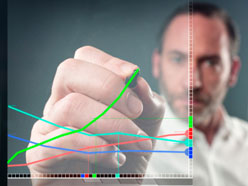
CFA Society Toronto and Hillsdale Investment Management report William J. McNally, Andriy Shkilko and Brian F. Smith of Wilfrid Laurier University have won the 2012 Canadian Investment Research Award for their paper, “Do Brokers of Insiders Tip Other Clients?”
“One would like to believe there is no grey in the application of regulations governing insider trading in Canada,” says Chris Guthrie, CFA, president and CEO, Hillsdale Investment Management. “This paper raises important questions about the obligations of all fiduciaries as well as about the ever changing role of technology in the distribution of insider information.”
Insiders are required to disclose their status to their brokers who, in turn, are required to flag insider orders on the TSX trading system. The unique TSX dataset has orders and trades for the period from October 2004 to December 2006 with the insider flag. Since the data also includes a broker ID for each order, Laurier researchers were able to track broker activity around insider trades.
Read: Curbing illicit flows of money
“Brokers of insiders have a bigger market share after an insider trade,” says Professor McNally. “They handle more agency trades in the same direction as the insider compared to the average for the other (active) brokers.”
He adds, “In addition, their market share of principal account trading also increases after the insider trade. This is the pattern that you would expect to see if the brokers of insiders tip their other clients about the insider trade. We are concerned about these results, because it suggests there might be an unfair playing field. Some traders are receiving valuable information before the rest of the market. This lack of fairness may lead to a reduction in liquidity, which is bad for the entire market.”
Read: Hedge fund managers found guilty of insider trading
Key findings include:
- The market share of the insider’s broker is about the same as the market share of the average competitive broker prior to an insider trade and then rises sharply on the day of the insider trade.
- The abnormal market share (the difference between the broker’s share of client trades and the share of the average broker) jumps from 0.7% on the day before to 3.8% on the day of the insider purchase. Similarly for insider sales, the share rises from 0.9% before to 4.5% on the day of the sale. Furthermore, the market shares spike in the half-hour interval immediately surrounding the insider trades.
- Independent brokers experience significantly larger market share increases than brokers affiliated with banks. Evidence of tipping is stronger in broker handling of shares of smaller companies. This is consistent with greater information asymmetry between the insiders and outsiders in smaller companies.
- The insider’s broker’s market share of principal trading doubles on the day of the insider trade for both insider purchases and sales. This suggests brokers trade on their own account or they tip other employees in the firm.